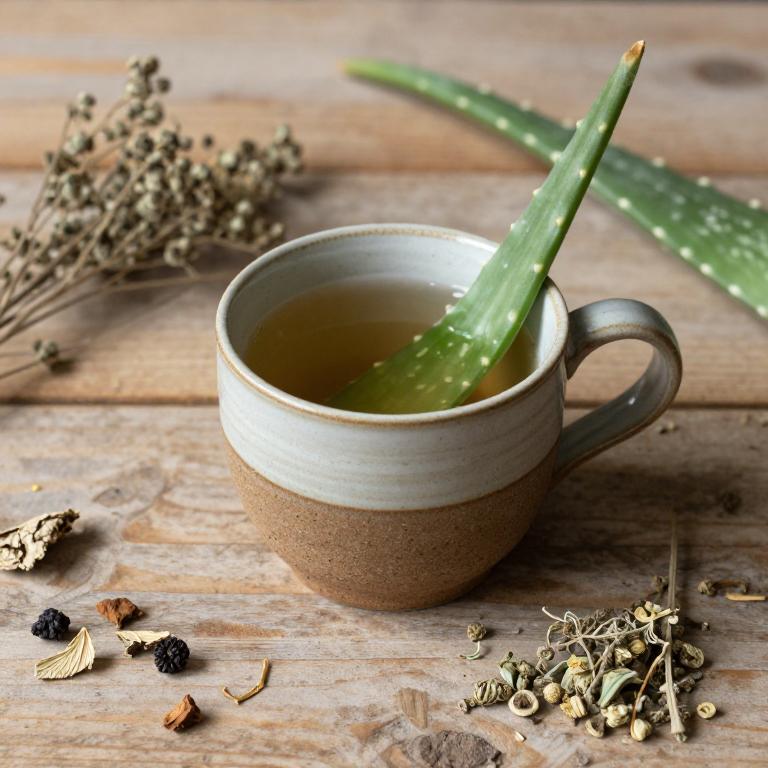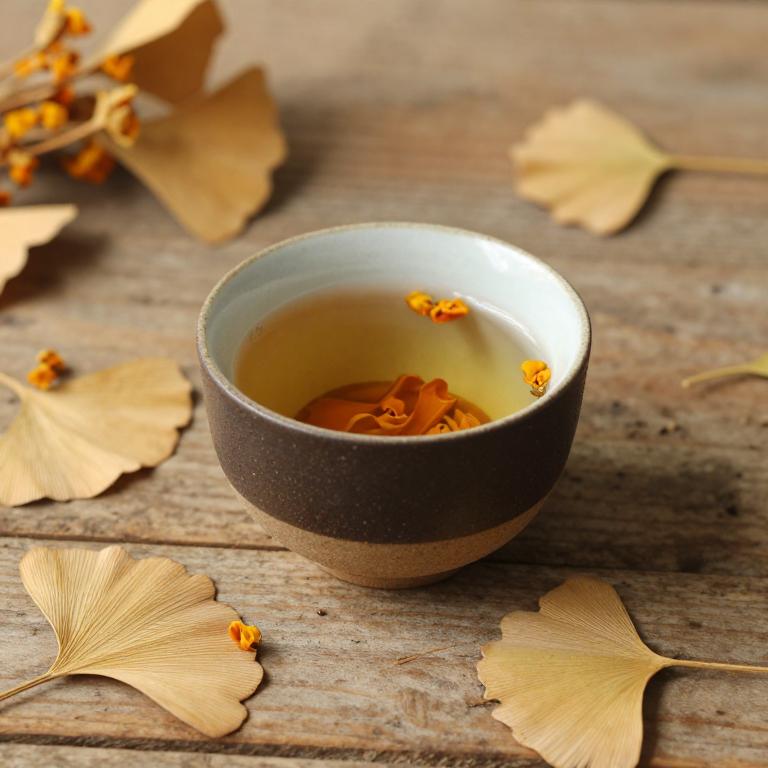10 Best Herbal Teas For Baldness

Herbal teas have been traditionally used for various health purposes, including promoting hair growth and addressing baldness.
Certain herbs such as nettle, rosemary, and ginger are believed to stimulate blood circulation to the scalp, which may support healthy hair follicles. Some herbal tea blends are marketed as natural alternatives to conventional treatments for hair loss, though scientific evidence supporting their efficacy is limited. While drinking these teas may contribute to overall scalp health, they are not a guaranteed solution for baldness and should be used in conjunction with other proven treatments.
It is important to consult a healthcare professional before relying solely on herbal teas for hair loss concerns.
Table of Contents
- 1. Chaste tree (Vitex agnus-castus)
- 2. Turmeric (Curcuma longa)
- 3. Thistle (Silybum marianum)
- 4. Field horsetail (Equisetum arvense)
- 5. Blessed thistle (Cnicus benedictus)
- 6. Aloe vera (Aloe barbadensis)
- 7. Stinging nettle (Urtica dioica)
- 8. Ginkgo (Ginkgo biloba)
- 9. St. john's wort (Hypericum perforatum)
- 10. Salvia (Salvia officinalis)
1. Chaste tree (Vitex agnus-castus)

Vitex agnus-castus, commonly known as chasteberry, is a herbal remedy that has been traditionally used to support hormonal balance, which may indirectly influence hair growth.
While there is limited scientific evidence directly linking vitex to the prevention or reversal of baldness, some studies suggest it may help regulate female hormones, potentially improving conditions like polycystic ovary syndrome (PCOS) that can contribute to hair thinning. Herbal teas made from vitex are often consumed to support overall hormonal health, which may have a positive effect on scalp and hair condition. However, it is important to note that vitex is not a proven treatment for male or female pattern baldness, and individuals experiencing significant hair loss should consult a healthcare professional for a comprehensive approach.
As with any herbal remedy, vitex should be used with caution and under the guidance of a qualified practitioner.
2. Turmeric (Curcuma longa)

Curcuma longa, commonly known as turmeric, has been traditionally used in herbal teas for its potential health benefits, including anti-inflammatory and antioxidant properties.
While there is limited scientific evidence directly linking turmeric tea to the prevention or treatment of baldness, some studies suggest that curcumin, the active compound in turmeric, may support hair follicle health by reducing oxidative stress and inflammation. Herbal teas made from turmeric are often consumed as part of a holistic approach to hair care, alongside a balanced diet and proper scalp hygiene. However, it is important to note that baldness can have various causes, such as genetics, hormonal imbalances, or medical conditions, and turmeric tea alone is unlikely to reverse significant hair loss.
As with any herbal remedy, it is advisable to consult a healthcare professional before incorporating turmeric tea into a treatment regimen for hair loss.
3. Thistle (Silybum marianum)

Silybum marianum, also known as milk thistle, is a herbal plant traditionally used for its potential health benefits, including liver support and antioxidant properties.
While there is limited scientific evidence directly linking silybum marianum to hair growth, some studies suggest that its compounds may promote cellular health and reduce oxidative stress, which could indirectly support hair follicle function. Herbal teas made from silybum marianum are often consumed for their purported ability to enhance overall vitality, which may contribute to healthier hair. However, it is important to note that there are no conclusive clinical trials proving its effectiveness for treating baldness.
Individuals considering silybum marianum for hair loss should consult with a healthcare professional to ensure it is safe and appropriate for their individual health needs.
4. Field horsetail (Equisetum arvense)

Equisetum arvense, commonly known as horsetail, is a traditional herbal remedy that has been used for centuries to support hair growth and address baldness.
This plant is rich in silica, which is believed to strengthen hair strands and improve scalp health. While scientific evidence supporting its effectiveness for baldness is limited, many users report positive results when using horsetail herbal teas regularly. The tea is often prepared by steeping dried horsetail in hot water and consuming it as a daily tonic.
However, it is important to consult with a healthcare professional before using horsetail, as it may interact with certain medications and has potential side effects.
5. Blessed thistle (Cnicus benedictus)

Cnicus benedictus, commonly known as blessed thorn, has been traditionally used in herbal medicine for its potential benefits in promoting hair growth and preventing baldness.
This herb is believed to stimulate the scalp and improve circulation, which may support healthy hair follicles. While scientific research on its efficacy for baldness is limited, some studies suggest it contains compounds that may inhibit the enzyme 5-alpha-reductase, which is linked to male pattern baldness. Herbal teas made from Cnicus benedictus are often consumed internally to harness its purported hair-supporting properties.
However, it is important to consult with a healthcare professional before using it, especially if you have underlying health conditions or are taking other medications.
6. Aloe vera (Aloe barbadensis)

Aloe barbadensis, commonly known as aloe vera, is often touted for its potential health benefits, including its use in herbal teas.
While there is limited scientific evidence directly linking aloe vera tea to hair growth, some proponents believe that its nutrients and anti-inflammatory properties may support scalp health. Aloe vera tea is typically made by steeping the gel or leaves in hot water, and it is consumed for its soothing and detoxifying effects. Although it may not directly prevent baldness, some studies suggest that aloe vera could potentially improve blood circulation to the scalp, which is essential for hair growth.
As a result, some individuals use aloe vera tea as part of a holistic approach to maintaining healthy hair, though it should not be considered a standalone treatment for baldness.
7. Stinging nettle (Urtica dioica)

Urtica dioica, commonly known as stinging nettle, has been traditionally used in herbal remedies for various health conditions, including hair loss.
While there is limited scientific evidence directly linking stinging nettle tea to the prevention or treatment of baldness, some studies suggest that it may support hair health by providing essential nutrients like iron, silica, and vitamins A and C. The leaves of the plant are often brewed into a tea that is believed to strengthen hair follicles and improve scalp health. However, it is important to note that baldness can have multiple causes, such as genetics, hormonal changes, or medical conditions, and stinging nettle should not be considered a substitute for professional medical advice.
Individuals considering using stinging nettle tea for hair loss should consult with a healthcare provider to ensure it is safe and appropriate for their specific situation.
8. Ginkgo (Ginkgo biloba)

Ginkgo biloba herbal tea is often promoted for its potential to improve circulation and enhance scalp health, which may support hair growth.
While some studies suggest that ginkgo biloba can increase blood flow to the scalp, there is currently no strong scientific evidence directly linking it to hair regrowth or the treatment of baldness. The active compounds in ginkgo, such as flavonoids and terpenes, are believed to have antioxidant and anti-inflammatory properties that might indirectly benefit hair follicles. However, it is important to note that ginkgo biloba should not be considered a primary treatment for baldness without consulting a healthcare professional.
As with any herbal remedy, individual responses can vary, and it should be used as part of a comprehensive approach to hair health.
9. St. john's wort (Hypericum perforatum)

Hypericum perforatum, commonly known as St. John's Wort, is a herbal plant traditionally used for its potential mood-enhancing properties, but it is not scientifically supported as an effective treatment for baldness.
While some people may believe that herbal teas made from St. John's Wort can promote hair growth, there is no strong evidence to back this claim. In fact, the active compounds in St. John's Wort, such as hypericin and hyperforin, may have side effects and can interact with certain medications, making it unsuitable for long-term use. For individuals concerned about hair loss, it is advisable to consult a healthcare professional to explore more effective and evidence-based treatments.
Ultimately, relying on herbal teas for baldness should be approached with caution and not replace proven medical interventions.
10. Salvia (Salvia officinalis)

Salvia officinalis, commonly known as sage, has been traditionally used in herbal teas for its potential health benefits, including its possible role in addressing hair loss.
While scientific evidence supporting its effectiveness for baldness is limited, some studies suggest that sage may help regulate hormonal imbalances, which can contribute to hair thinning and loss. The herb contains compounds like rosmarinic acid and flavonoids, which may promote scalp health and stimulate hair follicles. However, it is important to note that sage tea should not be considered a standalone solution for baldness and should be used in conjunction with other proven treatments.
As with any herbal remedy, it is advisable to consult a healthcare professional before incorporating sage into a hair care regimen.